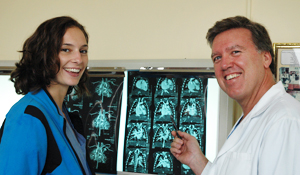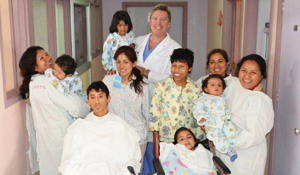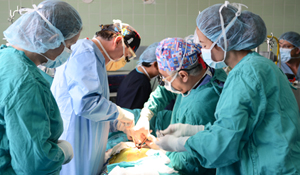

Heart Care International
Heart Care International — A Student's Perspective
While many automated e-mail signatures note: "Sent from my BlackBerry™ handheld mobile" or Note: Privileged/Confidential information may be contained in this message and may be subject to legal privilege," fourth-year medical student Megan Long's e-mail disclaimer features a quote from Margaret Mead:
"Never doubt that a small group of thoughtful, committed people can change the world. Indeed, it is the only thing that ever has."

Fourth-year student Megan Long with Dr. Robert Michler, founder of Heart Care InternationalThis Einstein ethos is no more evident than in the recent trip to Peru that Ms. Long undertook in conjunction with Dr. Robert Michler, chair of cardiovascular & thoracic surgery and of surgery at Einstein and director of the Montefiore-Einstein Heart Center, and his team from Heart Care International (HCI). Ms. Long was part of the team of doctors, nurses, surgeons and students who went to Peru to perform an array of complex and sophisticated cardiac surgeries on the neediest of patients – children and young adults suffering and dying from heart disease.
With a broad range of experiences that include working at Small Miracles International between undergrad and medical school, travelling to Guatemala on medical missions, spending the last four years deeply involved in Einstein's student-run ECHO clinic, and working last summer with the Indian Public Health Service in Montana, Ms. Long thought she had a well-rounded perspective on underserved populations and lack of care. Yet the medical mission with Heart Care International (HCI) to Peru brought a whole new dimension to her medical education.
"Now that I have more medical training, I notice the differences in medical care," said Ms. Long. She observed that, in the midst of a major metropolitan hospital, one of the biggest questions became how to toe the line of cultural and experiential differences to balance providing care with providing training for doctors.
That balance is the guiding principle behind HCI, which was founded by Dr. Michler in 1994. Dr. Michler had traveled to China to do surgical operations in 1992 and, upon his return, was asked by a Guatemalan pediatric cardiologist to accept patients from Guatemala for open heart surgery. Stymied by the costs and upheaval involved for the patients, their families and the hospital, Dr. Michler decided to bring the care to them.
He took his first team and 15,000 pounds of equipment to Guatemala City in 1994. In one week, they operated on 25 children.
"It was an extraordinary experience," said Dr. Michler. "But, when we came back I didn't have plans to do it again. It was so exhausting and time-consuming from a planning perspective. I hadn't considered it. And, then, the calls started coming."

Dr. Michler with some Peruvian staff and patientsThe calls were from those from the medical staff who had gone, those who could not go, and those whose lives depended on the HCI team returning. They all said the same thing: 'Let's do it again.'"
Dr. Michler established Heart Care International with the philosophy of 'give a man a fish and he eats for a day, teach a man to fish and he eats for a lifetime.' For HCI, the focus would be on training physicians from the host country to do the kinds of surgery that he and his team had provided. Instead of hopping around trying to provide a surgery here, and a surgery there, Heart Care International would focus for five years on creating what Dr. Michler calls "a lasting legacy of support" in a host country. HCI has developed lasting relationships in Guatemala, the Dominican Republic, El Salvador and now Peru.
The guiding principle is to find sites where he and his colleagues can make the most impact, partnering with doctors and hospitals that have a level of care and commitment to training, and reaching out to government officials, agencies and benefactors so that the care will be pro bono for the children and their families.
"We are committed to advancing the quality of care, one patient at a time while working with the same group of doctors and nurses at the host facility to train the entire cardiac care team," said Dr. Michler. The team goes to each site multiple times and the training includes the surgery, pre- and post-op management, fluid balance and advanced diagnostics.
On each mission, the Heart Care International team also brings sophisticated equipment and supplies, which are mostly donated to the hospital. "We outfit the hospital to perform the most sophisticated surgery in the world," said Dr. Michler.
Dr. Samuel Weinstein, associate professor of clinical cardiovascular and thoracic surgery at Einstein, has been involved with Heart Care International since the group's third trip to Guatemala, in 1996. He has now been on more than 20 missions. "I think it is part of being a doctor," he said, of his commitment to the foundation. "You need social consciousness."
He added, "It helps you understand the realities. What we have in America is unique and rare. It often is not practical in other countries where there is not enough money to go around."

Dr. Michler teaching local doctors during a surgeryTaking part in one of the team's missions also gives students like Megan Long a new perspective. "They see what they wouldn't see in the United States," said Dr. Michler, "It's not what they've been reading about in text books, not what they've seen on rounds in the U.S. The biggest issue is how advanced the state of the disease is in so many of these children, because these patients have not had access to care."
Students who travel with Heart Care International are treated like doctors and participate in front-line medical care, playing an active role in all the work that the HCI team does – all under the watchful eyes of the HCI team.
Because of the focus on training, balance and cultural awareness are key. "I see the cultural differences," said Ms. Long. "They have their own way of doing things. And our surgeons are used to doing things our way. This makes it more challenging, but also more rewarding. The surgeries we performed were very complicated and there was always the big question of how best to accomplish the HCI mission of teaching with the challenges of handling very complicated diseases. The HCI team assisted the Peruvian surgeons with less complicated surgeries, while the Peruvians assisted the HCI surgeons with the most complicated operations."
During the mission to Peru, the HCI team did a lot of each. And, for Ms. Long, the process was an education. "There were different languages and different approaches. Seeing how those things came together, how decisions were made to create a unified management plan, was really inspiring."
Dr. Weinstein finds the Einstein students who join their team uniquely suited to the task. "Our students are very savvy and culturally aware," he said. "They have worked in the Bronx. There is a cultural component that they are sensitive to."
For Megan Long, the experience will resonate far into her future. "Whatever I end up doing in healthcare, I want to work with a group like this. It is so rewarding," she said. "I touched the human heart, both physically and emotionally, and had a wonderful time."
Posted on: Monday, December 5, 2011

Tablet Blog